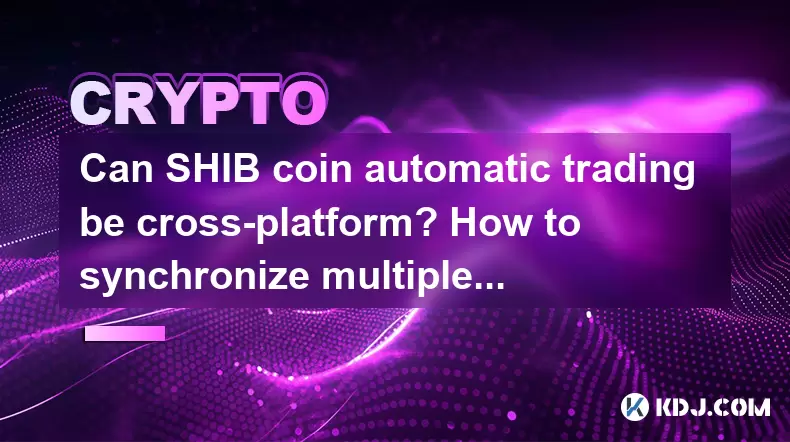-
 Bitcoin
Bitcoin $114000
0.76% -
 Ethereum
Ethereum $3488
0.53% -
 XRP
XRP $2.908
2.27% -
 Tether USDt
Tether USDt $1.000
0.05% -
 BNB
BNB $750.3
0.39% -
 Solana
Solana $161.9
0.14% -
 USDC
USDC $1.000
0.03% -
 TRON
TRON $0.3258
1.22% -
 Dogecoin
Dogecoin $0.1991
1.38% -
 Cardano
Cardano $0.7260
3.39% -
 Hyperliquid
Hyperliquid $38.20
2.33% -
 Stellar
Stellar $0.3987
7.33% -
 Sui
Sui $3.414
1.17% -
 Chainlink
Chainlink $16.28
2.52% -
 Bitcoin Cash
Bitcoin Cash $542.2
2.07% -
 Hedera
Hedera $0.2489
7.51% -
 Ethena USDe
Ethena USDe $1.001
0.05% -
 Avalanche
Avalanche $21.40
0.70% -
 Toncoin
Toncoin $3.635
0.75% -
 Litecoin
Litecoin $109.8
2.04% -
 UNUS SED LEO
UNUS SED LEO $8.955
-0.02% -
 Shiba Inu
Shiba Inu $0.00001221
2.44% -
 Uniswap
Uniswap $9.152
2.20% -
 Polkadot
Polkadot $3.588
2.09% -
 Monero
Monero $298.1
1.27% -
 Dai
Dai $1.000
0.01% -
 Bitget Token
Bitget Token $4.326
1.28% -
 Pepe
Pepe $0.00001045
1.96% -
 Cronos
Cronos $0.1330
4.27% -
 Aave
Aave $257.9
2.12%
Can SHIB coin automatic trading be cross-platform? How to synchronize multiple exchanges?
SHIB coin traders can automate trading across platforms using bots like 3Commas and Cryptohopper, synchronizing multiple exchanges for optimal performance and security.
May 19, 2025 at 09:42 pm

The world of cryptocurrency trading is dynamic and ever-evolving, with new tokens and trading strategies emerging regularly. Among these, SHIB coin, also known as Shiba Inu, has garnered significant attention. For traders interested in automating their SHIB coin trading activities, a critical consideration is whether such automation can be cross-platform. Additionally, synchronizing trading activities across multiple exchanges adds another layer of complexity and efficiency. In this article, we delve into the possibility of cross-platform automatic trading for SHIB coin and provide a detailed guide on how to synchronize multiple exchanges.
Understanding Cross-Platform Automatic Trading for SHIB Coin
Cross-platform automatic trading refers to the ability to execute trading strategies across different operating systems and devices without interruption. For SHIB coin, this means that traders can seamlessly switch between their desktop, laptop, tablet, or smartphone while maintaining the continuity of their trading activities.
To achieve cross-platform automatic trading, traders typically rely on trading bots or software that are designed to be compatible with various operating systems. These bots can access SHIB coin markets on different exchanges and execute trades based on predefined rules and algorithms.
Choosing the Right Trading Bot for SHIB Coin
Selecting the appropriate trading bot is crucial for successful cross-platform automatic trading of SHIB coin. Some popular trading bots that support SHIB coin include 3Commas, Cryptohopper, and HaasOnline. These bots offer features such as backtesting, paper trading, and real-time market analysis, which are essential for effective trading.
When choosing a trading bot, consider the following factors:
- Compatibility: Ensure the bot supports the operating systems you use, such as Windows, macOS, Linux, iOS, and Android.
- Exchange Support: Verify that the bot can connect to the exchanges where you trade SHIB coin.
- User Interface: A user-friendly interface can make it easier to set up and manage your trading strategies.
- Security: Look for bots that offer robust security features to protect your trading accounts and funds.
Setting Up Cross-Platform Automatic Trading for SHIB Coin
To set up cross-platform automatic trading for SHIB coin, follow these steps:
- Choose and Install the Trading Bot: Select a trading bot that meets your needs and install it on your primary device. For example, if you choose 3Commas, download the app from their website or app store.
- Create an Account: Sign up for an account with the trading bot service. This usually involves providing an email address and setting up a password.
- Connect Exchanges: Link your SHIB coin trading accounts on various exchanges to the trading bot. This typically involves entering your API keys from each exchange into the bot's settings.
- Configure Trading Strategies: Set up your trading strategies for SHIB coin within the bot. This may include setting stop-loss orders, take-profit levels, and other parameters.
- Test the Setup: Before going live, use the bot's backtesting or paper trading features to test your strategies and ensure they work as expected across different platforms.
- Go Live: Once satisfied with your setup, activate the bot to start automatic trading of SHIB coin across your chosen platforms.
Synchronizing Multiple Exchanges for SHIB Coin Trading
Synchronizing trading activities across multiple exchanges is essential for maximizing trading opportunities and managing risk. Here’s how to synchronize multiple exchanges for SHIB coin trading:
- Use a Trading Bot with Multi-Exchange Support: Choose a trading bot that supports multiple exchanges. For instance, Cryptohopper allows you to connect to over 100 different exchanges.
- Set Up API Keys: For each exchange where you trade SHIB coin, generate API keys. These keys allow the trading bot to access your account and execute trades on your behalf.
- Configure the Bot: Within the trading bot, enter the API keys for each exchange. Ensure that you grant the bot the necessary permissions to trade SHIB coin.
- Create Unified Trading Strategies: Develop trading strategies that can be applied across all connected exchanges. This might involve setting similar buy and sell conditions for SHIB coin on each platform.
- Monitor and Adjust: Regularly monitor the performance of your trading strategies across different exchanges. Adjust the settings as needed to optimize your trading results.
Ensuring Security and Reliability in Cross-Platform Trading
Security is paramount when engaging in cross-platform automatic trading of SHIB coin. Here are some best practices to ensure the safety of your trading activities:
- Use Strong API Keys: Generate unique API keys for each exchange and limit their permissions to only what is necessary for trading.
- Enable Two-Factor Authentication (2FA): Activate 2FA on both your exchange accounts and trading bot account to add an extra layer of security.
- Regularly Update Software: Keep your trading bot and operating systems up to date to protect against vulnerabilities.
- Monitor Account Activity: Regularly check your trading accounts for any unauthorized activity and review the bot's trading logs.
Troubleshooting Common Issues in Cross-Platform Trading
Despite careful setup, traders may encounter issues when engaging in cross-platform automatic trading of SHIB coin. Here are some common problems and their solutions:
- Connection Issues: If the trading bot loses connection to an exchange, check your internet connection and ensure the exchange's servers are operational. Also, verify that your API keys are still valid.
- Inconsistent Trading Results: If your trading strategies yield different results across platforms, review the settings for each exchange to ensure they are consistent. Consider market differences that might affect SHIB coin's performance.
- Software Crashes: If the trading bot crashes, restart it and check for any software updates. If the issue persists, contact the bot's support team for assistance.
Frequently Asked Questions
Q: Can I use the same trading bot on different devices simultaneously?
A: Yes, many trading bots allow you to log in from multiple devices simultaneously. However, ensure that the bot's terms of service permit this and that you are not violating any usage policies.
Q: How do I ensure my trading bot is executing trades correctly across different exchanges?
A: Regularly review the trading logs and performance reports provided by the bot. Additionally, manually check your exchange accounts to confirm that trades are being executed as expected.
Q: What should I do if my trading bot stops working on one platform but continues on another?
A: First, check for any platform-specific issues, such as API key problems or exchange downtime. If the issue is isolated to one platform, contact the exchange's support team. If the problem is with the bot, reach out to the bot's support for assistance.
Q: Are there any risks associated with using a trading bot for cross-platform trading of SHIB coin?
A: Yes, there are risks, including potential security breaches, software malfunctions, and market volatility. Always use strong security measures and monitor your trading activities closely to mitigate these risks.
Disclaimer:info@kdj.com
The information provided is not trading advice. kdj.com does not assume any responsibility for any investments made based on the information provided in this article. Cryptocurrencies are highly volatile and it is highly recommended that you invest with caution after thorough research!
If you believe that the content used on this website infringes your copyright, please contact us immediately (info@kdj.com) and we will delete it promptly.
- XRP: Crypto Analyst's Smartest Buy in 2025?
- 2025-08-04 00:30:13
- SEC, Crypto Regulation, and Digital Assets: A New Era?
- 2025-08-04 00:30:13
- Navigating the Meme Coin Mania: Cold Wallets, SHIB, and DOGE in 2025
- 2025-08-03 22:30:16
- Bitcoin's Price Fall and Scrutiny: What's a New Yorker to Think?
- 2025-08-03 22:30:16
- Shiba Inu's Resistance and Recovery Push: What's Next for SHIB?
- 2025-08-03 22:50:16
- Bitcoin, Hashcash, and Crypto Innovation: A Look at the Foundation and Future
- 2025-08-03 23:12:53
Related knowledge

What is Chainlink (LINK)?
Jul 22,2025 at 02:14am
Understanding Chainlink (LINK): The Decentralized Oracle NetworkChainlink is a decentralized oracle network designed to bridge the gap between blockch...

What is Avalanche (AVAX)?
Jul 22,2025 at 08:35am
What is Avalanche (AVAX)?Avalanche (AVAX) is a decentralized, open-source blockchain platform designed to support high-performance decentralized appli...

What is Polkadot (DOT)?
Jul 19,2025 at 06:35pm
Understanding the Basics of Polkadot (DOT)Polkadot (DOT) is a multi-chain network protocol designed to enable different blockchains to transfer messag...

What is Litecoin (LTC)?
Jul 23,2025 at 11:35am
Overview of Litecoin (LTC)Litecoin (LTC) is a peer-to-peer cryptocurrency that was created in 2011 by Charlie Lee, a former Google engineer. It is oft...

What is Monero (XMR)?
Jul 21,2025 at 10:07am
What is Monero (XMR)?Monero (XMR) is a decentralized cryptocurrency designed to provide enhanced privacy and anonymity for its users. Unlike Bitcoin a...

How to add indicators to Ethereum chart on TradingView?
Jul 19,2025 at 07:15am
What Is an Ethereum Chart on TradingView?The Ethereum chart on TradingView is a visual representation of the price movement of Ethereum (ETH) over a s...

What is Chainlink (LINK)?
Jul 22,2025 at 02:14am
Understanding Chainlink (LINK): The Decentralized Oracle NetworkChainlink is a decentralized oracle network designed to bridge the gap between blockch...

What is Avalanche (AVAX)?
Jul 22,2025 at 08:35am
What is Avalanche (AVAX)?Avalanche (AVAX) is a decentralized, open-source blockchain platform designed to support high-performance decentralized appli...

What is Polkadot (DOT)?
Jul 19,2025 at 06:35pm
Understanding the Basics of Polkadot (DOT)Polkadot (DOT) is a multi-chain network protocol designed to enable different blockchains to transfer messag...

What is Litecoin (LTC)?
Jul 23,2025 at 11:35am
Overview of Litecoin (LTC)Litecoin (LTC) is a peer-to-peer cryptocurrency that was created in 2011 by Charlie Lee, a former Google engineer. It is oft...

What is Monero (XMR)?
Jul 21,2025 at 10:07am
What is Monero (XMR)?Monero (XMR) is a decentralized cryptocurrency designed to provide enhanced privacy and anonymity for its users. Unlike Bitcoin a...

How to add indicators to Ethereum chart on TradingView?
Jul 19,2025 at 07:15am
What Is an Ethereum Chart on TradingView?The Ethereum chart on TradingView is a visual representation of the price movement of Ethereum (ETH) over a s...
See all articles

























































































